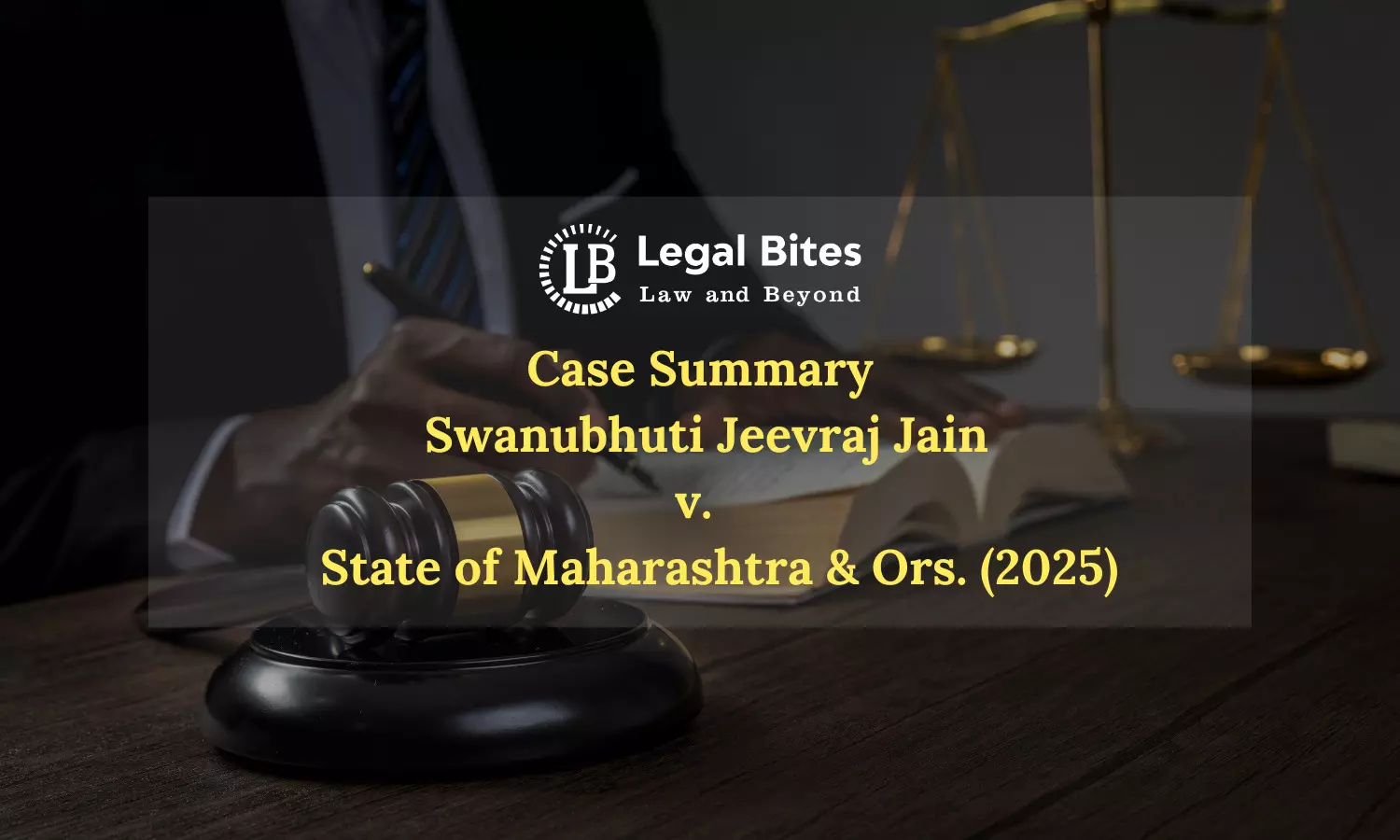Case Summary: Swanubhuti Jeevraj Jain v. State of Maharashtra & Ors. (2025) | A Legal Examination of Caste Certificate Claims
This case highlights the need for strict scrutiny of caste benefits via maternal lineage, ensuring reservations reach the truly disadvantaged.

This case, decided by the Bombay High Court on February 10, 2025, revolves around the petitioner, Swanubhuti Jeevraj Jain, seeking a caste certificate based on her mother’s caste. The case raises significant constitutional questions regarding the recognition of caste through maternal lineage and the right to avail of reservation benefits under the Social Justice framework. The petitioner challenges the Maharashtra state authorities' rejection of her caste certificate application, citing violations of constitutional rights and procedural lapses in the existing digital infrastructure.
Case Title: Swanubhuti Jeevraj Jain v. State of Maharashtra & Ors.
Court: Bombay High Court
Citation: WP No. 9195 of 2024
Bench: Justice Ravindra V. Ghuge and Justice Ashwin D. Bhobe
Date of Judgment: 10th February 2025
Facts of the Case
- The petitioner, a 30-year-old woman, applied for an OBC caste certificate based on her mother’s caste (Shimpi community – OBC category). Her father belongs to the Jain community, which falls in the open category.
- The application was rejected because the state’s online portal, ‘Aaple Sarkar,’ only accepts caste details from the father’s side.
- The petitioner challenged this practice and sought an amendment to the online application system to allow the entry of maternal caste details.
- She argued that her upbringing was primarily under her mother’s influence and that her father did not subscribe to any caste identity.
- The petitioner claimed that her rejection was violative of Articles 14 (Right to Equality), 15 (Prohibition of Discrimination), and 25 (Freedom of Religion) of the Indian Constitution.
- She also requested amendments to the Maharashtra Caste Certificate Rules and the online portal to accommodate applications based on maternal lineage.
Issues
- Whether a person can claim caste based on their mother’s lineage under Indian law.
- Whether the petitioner is entitled to reservation benefits despite her previous identification with her father’s caste.
Arguments of the Petitioner
The petitioner emphasized that she was raised by her mother, who belongs to the Shimpi community, and thus, her caste should be determined by her maternal lineage.
She cited Supreme Court precedents, such as Rameshbhai Dabhai Naika v. State of Gujarat & Ors. (2012) and Valsamma Paul v. Cochin University (1996), discuss caste determination in inter-caste marriages.
She argued that the state’s refusal to grant a caste certificate based on maternal lineage was discriminatory and arbitrary, violating Article 14 of the Constitution. She contended that the technical restrictions of the ‘Aaple Sarkar’ portal are unconstitutional as they restrict legitimate claims based on maternal caste. She also invoked Article 25, stating that every citizen has the right to choose and practice religion freely, which extends to caste identity.
Arguments of the Respondents
- The State, represented by the Assistant Government Pleader, contended that caste is traditionally determined by paternal lineage unless exceptional circumstances demonstrate a complete detachment from the father.
- The government cited previous judgments emphasizing that caste-based reservations should only benefit those who have suffered historical and systemic disadvantages.
- The State argued that the petitioner had always identified with her father’s open-category caste, studied in reputed institutions, and had not faced social disadvantages.
- It was pointed out that the petitioner’s mother applied for an OBC caste certificate only in 2022, after which the petitioner sought to claim the status for reservation benefits.
- The respondents highlighted that the petitioner had already appeared for competitive exams under the open category, and her attempt to claim OBC status was self-serving.
Court’s Analysis and Findings
- The Court acknowledged that the Supreme Court has permitted individuals to claim caste identity from their mother in cases where the child has been solely raised by the mother and has not influenced the father.
- However, in this case, the Court found no evidence that the petitioner had been detached from her father or that her upbringing was solely influenced by her mother.
- The petitioner’s school and college records, Adhar card, and address details confirmed that she had consistently used her father’s caste and address.
- The Court emphasized the Valsamma Paul ruling, which states that individuals cannot claim reservation benefits if they have not suffered the socio-economic disadvantages of the community.
- The Court found that the petitioner was attempting to switch caste identity for competitive exam benefits rather than due to actual socio-economic backwardness.
- The Court ruled that caste status is not just about lineage but must be assessed on factors such as upbringing, social exposure, and disadvantages faced.
- The Court rejected the petitioner’s demand for a caste certificate based on her mother’s caste but directed the State Government to consider amending the ‘Aaple Sarkar’ portal to accommodate exceptional cases where maternal lineage can be used.
Judgment
- The petition was dismissed as the Court found it devoid of merit.
- The Court held that the petitioner had failed to demonstrate a valid claim under established legal principles.
- The Court reaffirmed that caste certificates should only be granted after due verification to prevent misuse of reservations.
- The State was directed to set up a committee to explore the feasibility of allowing maternal caste claims in genuine cases on the ‘Aaple Sarkar’ portal.
Conclusion
This judgment reinforces the principle that caste identity cannot be arbitrarily chosen for reservation benefits. While courts recognize maternal caste claims in exceptional cases, the petitioner’s circumstances did not justify such a claim. The ruling underscores the importance of preventing fraudulent claims in the reservation system while advocating for procedural improvements in government portals. The Court’s directive for a government review of the digital infrastructure ensures that genuine cases of maternal caste inheritance can be accommodated in the future.
Click Here to Read the Official Judgment


